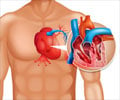Quality of life can be improved in heart attack patients along with the reduction in fear of activity with the aid of an eight-week program of mindfulness meditation

‘Quality of life can be improved in heart attack patients along with the reduction in fear of activity with the aid of an eight-week program of mindfulness meditation. This revealed that the patients in the mindfulness group experienced overall better quality of life as compared to the control group with better improvement in emotional function.’





The study team randomly enrolled 56 patients with an average age of 55 years and a history of heart attack for a mindfulness or control group for eight weeks. One 15-minute individual education session on the structure and function of the heart, the coronary arteries, and diseases of the heart was attended by the control group. Whereas patients assigned to the mindfulness intervention underwent a 15-minute individual session on the description of the technique followed by 15 minutes of supervised practice. During the session the patients were asked to sit comfortably on a chair with their backs straight and eyes closed. They were then instructed to breathe deeply - inhaling through the nose and exhaling through the mouth using the diaphragm - and focus on their breathing and the present moment.
Meditation for Heart Attack Survivors
To evaluate compliance with the study protocol and promote motivation for meditation, the participants received a recording of the instructions via WhatsApp along with daily reminders (text messages or phone calls) to repeat the 15-minute session every day at home in a quiet room.
Assessment tools such as the Piper Fatigue Scale for fatigue measurement, Tampa Scale for Kinesiophobia Heart questionnaire, and MacNew Heart Disease Health-Related Quality of Life questionnaire were utilized to evaluate daily function overall physically, emotionally, and socially at baseline and weeks - four, eight, and twelve.
Advertisement
This revealed that the patients in the mindfulness group experienced overall better quality of life as compared to the control group. The changes seemed to improve better in emotional function in the 12th week. Measurements of fatigue did not vary between the two groups at any time point.
Advertisement
Source-Medindia















